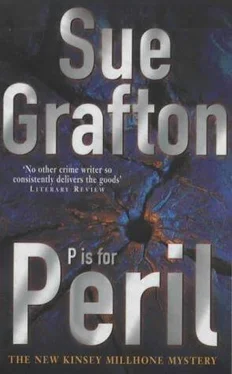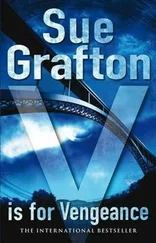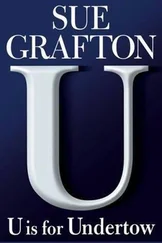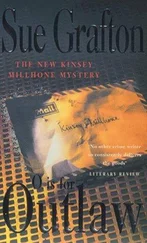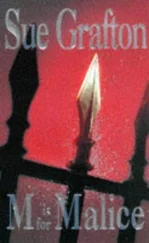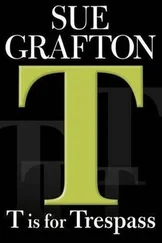"Gets complicated," I remarked.
"Very. At any rate, now that HCFA has stepped in, they're insisting on documentation for every such transaction, including the lease agreement, which is where we come in."
"But you don't think he's really guilty."
"I don't. At the same time, it isn't looking good for him."
"You think he left to avoid disgrace?"
"Possibly," he said. "If he felt unable or unwilling to face the charges. I'm not sure how he'll deal with the humiliation if they decide to prosecute. I'm not sure how any of us would deal with that. He's a man in big trouble. I don't like to think of him as a coward as well."
"When did you see him last? Do you remember the occasion?"
"Of course. September 12, the day he disappeared. I took him out to lunch."
"I didn't realize that. Was this at his request or yours?"
"His. He called and asked to see me. Of course, I said yes. By then, I knew about his difficulties. I had some other business in that part of town so we met at a little place in walking distance of Pacific Meadows. Just a hole in the wall called Dickens, a mock English pub. It's quiet and affords a measure of privacy, which I knew he'd appreciate."
"Did he talk about the problems with Medicare?"
"Not directly. He did ramble on a bit about the ongoing investigation. He was clearly upset. He seemed to want reassurances that Harvey and I would come to his defense. I did what I could to put his mind at rest, but I told him I couldn't condone anything underhanded. I don't mean to sound pompous, but in truth, if the charges turn out to be provable, then Dow's actions are not just unethical, they're illegal. As much as I like and admire the man, there's no way I'd be willing to cover for him, even if I could."
"But why would he risk it? Especially at his age and station in life. He couldn't need the money."
"I'm not so sure about that. Dow always did well for himself financially, but Crystal is high maintenance. She costs him a bundle. He has two houses to maintain-you know he bought Crystal that beach house at her insistence. Nothing would do, but she had to have that place. Plus he has Fiona's alimony, which is burdensome to say the least. Crystal likes to travel and she does it in style, including first-class airfare and accommodations for Griffith's nanny along with everyone else. She's the kind of gal who insists on being gifted-birthdays, anniversaries, Christmas, Valentine's Day-she expects to receive jewelry and nothing cheap. She makes sure of that. Dana's theory is she's busy accruing personal assets in case the bottom drops out."
The phone rang again. This time his eyes didn't even flicker, so I went right on. "You think she married him for his money?"
He considered the question briefly and then shook his head. "I wouldn't say that. I think she genuinely loves the guy, but she's been poor all her life. She wants to make sure she's safe just in case something happens to him."
"What about the rumors of an extramarital affair on her part?"
"You'd have to ask Dana. She's the one who spotted that piece of shenanigans. I prefer to steer clear."
"Did Dr. Purcell say anything to suggest he might flee?"
Joel shook his head. "I don't remember anything of the kind. Is that the direction the police are leaning in?"
"Well, they can't rule it out. Apparently, his passport and a substantial sum of money are missing."
Joel stared at me as though trying to take that in. "If he ran, he'd have to continue running for the rest of his life."
"Maybe that's not as bad as the alternative. From what you say, he was feeling desperate."
"Exactly. He was horrified at the prospect effacing criminal penalties."
"I talked to an attorney who thinks it wouldn't be that bad. He might have to pay restitution, but he wouldn't go to jail."
"That wasn't his perception. He was deeply depressed. The government's getting tough. He knew they might well decide to make an example of him. More than anything we're talking about the loss of face, something I'm not sure he could handle." He paused, moving four pencils from one side of his table to the other.
I saw his gaze shift. "What's going through your mind?"
He shook his head. "Something I haven't dared say to anyone else. It crossed my mind-after seeing him that day-he might have been thinking of doing himself in. He was trying to cover his distress, but it might've been too much. He wasn't sure Crystal would stick with him once the scandal came to light. You have to ask yourself just how despondent he was and how far he'd go to get relief. I should have asked how he felt. I should have done what I could to reassure him, but I didn't."
"Joel?"
We both turned to find Dana standing in the doorway.
"Harvey's on line two. This is the second time he's called."
"Sorry. I better get this."
"Sure, go ahead. I appreciate your time. It's possible I'll want to talk to you again at a later date."
"Any time," he said. He stood up when I did and the two of us shook hands across his desk. By the time I reached the door, he'd picked up the phone.
Dana walked me to the elevator with its two-person capacity, the interior about the size of the average telephone booth. I could have run down the stairs in the time it took. During its slow, whirring descent, I said, "What's the story on Glint Augustine?"
"Simple. For the six months Augustine rented from us, Dow would go off to work and the next thing you know, Crystal would come sneaking out her backdoor, through the trees, and into the cottage. She'd be there an hour or so and then slip back home. Meanwhile, Rand minded the baby, taking him for endless walks around Horton Ravine. It got to be the talk of the neighborhood." We reached the first-floor foyer.
"Couldn't there be another explanation?"
Dana's smile was jaded. "Maybe they were having tea."
Santa Teresa Hospital-St. Terry's-is located on the upper west side, a neighborhood once devoted to open farmland, working vineyards, dairies, and stables, all with sweeping views to the mountains on the northern edge of town. Early black-and-white photographs of the area show wide, dusty roads, shanties flanked by groves of citrus and walnut trees, all leveled long ago. It's a world that appears curiously bald and flat: rural expanses planted with pampas grass and star pines that look like mere sprigs. A few unpretentious structures from that era remain, tucked like vintage treasures among modern-day buildings. The rest-churches, the original county courthouse, the wooden boarding houses, the dry goods establishment, the early mission, the trolley car barn, and numerous snazzy three-story hotels-were razed by intermittent earthquakes and fires, Nature's demolition crews.
It was not quite two o'clock when I parked on a side street and walked a block and a half to St. Terry's front entrance. The wind had picked up and the trees seemed restless, stirring uneasily. Occasionally a miniature rain shower would shake loose from the upper branches. The very air seemed gray and I was happy to pass into the hospital lobby through the sliding glass doors that parted at my approach. On my left, the coffee shop was sparsely occupied by hospital employees and visitors. I inquired at the information desk and was given directions to the office of the Director of Nursing Services. I passed a ladies' restroom and made a brief detour before I continued my quest.
I found Penelope Delacorte in a small private office with a window looking out onto the street. Overhead fluorescent lights contrasted sharply with the gloom outside. She was seated at her desk, using her pencil point to trace the lines of print on a photocopied memorandum.
When I knocked on the doorframe, she peered at me above a pair of half-glasses with tortoise-shell frames. She was in her early fifties, at that stage where she hadn't quite decided whether to dye her graying hair. I pictured her in arguments with her hairdresser, unsure of herself when it came to permanent versus temporary rinses. They likely also argued about the cut; Penelope clinging to the shoulder-length page boy she'd probably been wearing for years. Her bangs were too short and I wondered if she chopped them off herself between appointments. She removed her glasses and set them aside. "Yes?"
Читать дальше
